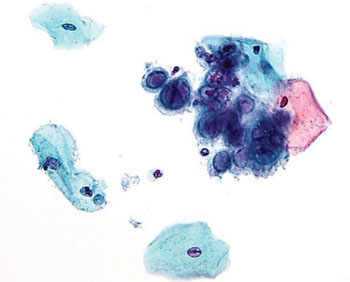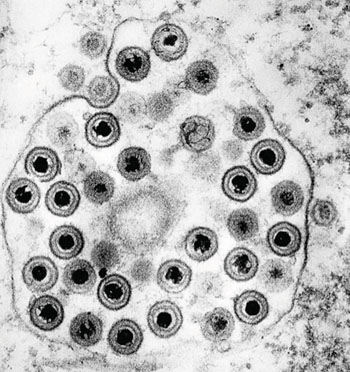Finger Prick Blood Test Approved for Herpes Simplex 1
|
By LabMedica International staff writers Posted on 04 Aug 2015 |

Image: Photomicrograph of the viral cytopathic effect of herpes simplex virus (HSV) showing multi-nucleation and ground glass chromatin (Photo courtesy of Nephron).

Image: Transmission electron micrograph (TEM) of numerous herpes simplex virions, members of the Herpesviridae virus family (Photo courtesy of Dr. Fred Murphy and Sylvia Whitfield).
A blood test and test system for the herpes simplex 1 virus (HSV-1) immunoglobulin G (IgG), has now received a Clinical Laboratory Improvement Amendments (CLIA) Waiver, permitting its use in locations outside of traditional clinical laboratories.
The system has built in fault-tolerance to deal with conditions that otherwise would impact results and performance and mitigate errors associated with otherwise unpredictable environments and therefore can be performed at least as well in the field with non-laboratory personnel as by trained operators in a traditional laboratory setting.
The US Food and Drug Administration (FDA; Silver Springs, MD, USA) concluded that the test and technology is eligible for waiver under CLIA. The waiver means FDA determined the test and technology is reliable and accurate and can be used in a broader set of locations outside of a traditional CLIA certified laboratory, including Wellness Centers. This is the first HSV test and test system to receive a CLIA waiver.
The test and test system for the herpes simplex 1 virus IgG (HSV-1) is manufactured by Theranos (Palo Alto, CA, USA) who provided study data from 818 subjects of varying age and ethnicity, demonstrating that its system could be run accurately using only a finger stick as well as a traditional venous draw across large numbers of Theranos devices, all compared against an FDA cleared, commercially available reference method.
Theranos’ HSV-1 studies included matrix comparison studies across 69 Theranos devices. The use of such a large number of devices in the studies is unusual as such studies are often run on a single or small number of devices. The larger number of devices allows for comprehensive characterization of variation across devices, which can be a source of variance in data across laboratories. Theranos’ HSV-1 clinical studies also included sensitivity and specificity studies with hundreds of human samples, both capillary and venous, Centers for Disease Control and Prevention (CDC; Atlanta.GA, USA) panel testing, which demonstrated 100% agreement with the results provided by CDC, low-prevalence population tests, and other studies.
Related Links:
US Food and Drug Administration
Theranos
Centers for Disease Control and Prevention
The system has built in fault-tolerance to deal with conditions that otherwise would impact results and performance and mitigate errors associated with otherwise unpredictable environments and therefore can be performed at least as well in the field with non-laboratory personnel as by trained operators in a traditional laboratory setting.
The US Food and Drug Administration (FDA; Silver Springs, MD, USA) concluded that the test and technology is eligible for waiver under CLIA. The waiver means FDA determined the test and technology is reliable and accurate and can be used in a broader set of locations outside of a traditional CLIA certified laboratory, including Wellness Centers. This is the first HSV test and test system to receive a CLIA waiver.
The test and test system for the herpes simplex 1 virus IgG (HSV-1) is manufactured by Theranos (Palo Alto, CA, USA) who provided study data from 818 subjects of varying age and ethnicity, demonstrating that its system could be run accurately using only a finger stick as well as a traditional venous draw across large numbers of Theranos devices, all compared against an FDA cleared, commercially available reference method.
Theranos’ HSV-1 studies included matrix comparison studies across 69 Theranos devices. The use of such a large number of devices in the studies is unusual as such studies are often run on a single or small number of devices. The larger number of devices allows for comprehensive characterization of variation across devices, which can be a source of variance in data across laboratories. Theranos’ HSV-1 clinical studies also included sensitivity and specificity studies with hundreds of human samples, both capillary and venous, Centers for Disease Control and Prevention (CDC; Atlanta.GA, USA) panel testing, which demonstrated 100% agreement with the results provided by CDC, low-prevalence population tests, and other studies.
Related Links:
US Food and Drug Administration
Theranos
Centers for Disease Control and Prevention
Latest Microbiology News
- Integrated Solution Ushers New Era of Automated Tuberculosis Testing
- Automated Sepsis Test System Enables Rapid Diagnosis for Patients with Severe Bloodstream Infections
- Enhanced Rapid Syndromic Molecular Diagnostic Solution Detects Broad Range of Infectious Diseases
- Clinical Decision Support Software a Game-Changer in Antimicrobial Resistance Battle
- New CE-Marked Hepatitis Assays to Help Diagnose Infections Earlier
- 1 Hour, Direct-From-Blood Multiplex PCR Test Identifies 95% of Sepsis-Causing Pathogens
- Mouth Bacteria Test Could Predict Colon Cancer Progression
- Unique Metabolic Signature Could Enable Sepsis Diagnosis within One Hour of Blood Collection
- Groundbreaking Diagnostic Platform Provides AST Results With Unprecedented Speed
- Simple Blood Test Combined With Personalized Risk Model Improves Sepsis Diagnosis
- Blood Analysis Predicts Sepsis and Organ Failure in Children
- TB Blood Test Could Detect Millions of Silent Spreaders
- New Blood Test Cuts Diagnosis Time for Nontuberculous Mycobacteria Infections from Months to Hours
- New Tuberculosis Test to Expand Testing Access in Low- and Middle-Income Countries
- Rapid Test Diagnoses Tropical Disease within Hours for Faster Antibiotics Treatment
- Rapid Molecular Testing Enables Faster, More Targeted Antibiotic Treatment for Pneumonia
Channels
Clinical Chemistry
view channel
3D Printed Point-Of-Care Mass Spectrometer Outperforms State-Of-The-Art Models
Mass spectrometry is a precise technique for identifying the chemical components of a sample and has significant potential for monitoring chronic illness health states, such as measuring hormone levels... Read more.jpg)
POC Biomedical Test Spins Water Droplet Using Sound Waves for Cancer Detection
Exosomes, tiny cellular bioparticles carrying a specific set of proteins, lipids, and genetic materials, play a crucial role in cell communication and hold promise for non-invasive diagnostics.... Read more
Highly Reliable Cell-Based Assay Enables Accurate Diagnosis of Endocrine Diseases
The conventional methods for measuring free cortisol, the body's stress hormone, from blood or saliva are quite demanding and require sample processing. The most common method, therefore, involves collecting... Read moreMolecular Diagnostics
view channelBlood Proteins Could Warn of Cancer Seven Years before Diagnosis
Two studies have identified proteins in the blood that could potentially alert individuals to the presence of cancer more than seven years before the disease is clinically diagnosed. Researchers found... Read moreUltrasound-Aided Blood Testing Detects Cancer Biomarkers from Cells
Ultrasound imaging serves as a noninvasive method to locate and monitor cancerous tumors effectively. However, crucial details about the cancer, such as the specific types of cells and genetic mutations... Read moreHematology
view channel
Next Generation Instrument Screens for Hemoglobin Disorders in Newborns
Hemoglobinopathies, the most widespread inherited conditions globally, affect about 7% of the population as carriers, with 2.7% of newborns being born with these conditions. The spectrum of clinical manifestations... Read more
First 4-in-1 Nucleic Acid Test for Arbovirus Screening to Reduce Risk of Transfusion-Transmitted Infections
Arboviruses represent an emerging global health threat, exacerbated by climate change and increased international travel that is facilitating their spread across new regions. Chikungunya, dengue, West... Read more
POC Finger-Prick Blood Test Determines Risk of Neutropenic Sepsis in Patients Undergoing Chemotherapy
Neutropenia, a decrease in neutrophils (a type of white blood cell crucial for fighting infections), is a frequent side effect of certain cancer treatments. This condition elevates the risk of infections,... Read more
First Affordable and Rapid Test for Beta Thalassemia Demonstrates 99% Diagnostic Accuracy
Hemoglobin disorders rank as some of the most prevalent monogenic diseases globally. Among various hemoglobin disorders, beta thalassemia, a hereditary blood disorder, affects about 1.5% of the world's... Read moreImmunology
view channel.jpg)
AI Predicts Tumor-Killing Cells with High Accuracy
Cellular immunotherapy involves extracting immune cells from a patient's tumor, potentially enhancing their cancer-fighting capabilities through engineering, and then expanding and reintroducing them into the body.... Read more
Diagnostic Blood Test for Cellular Rejection after Organ Transplant Could Replace Surgical Biopsies
Transplanted organs constantly face the risk of being rejected by the recipient's immune system which differentiates self from non-self using T cells and B cells. T cells are commonly associated with acute... Read more
AI Tool Precisely Matches Cancer Drugs to Patients Using Information from Each Tumor Cell
Current strategies for matching cancer patients with specific treatments often depend on bulk sequencing of tumor DNA and RNA, which provides an average profile from all cells within a tumor sample.... Read more
Genetic Testing Combined With Personalized Drug Screening On Tumor Samples to Revolutionize Cancer Treatment
Cancer treatment typically adheres to a standard of care—established, statistically validated regimens that are effective for the majority of patients. However, the disease’s inherent variability means... Read morePathology
view channel
AI Integrated With Optical Imaging Technology Enables Rapid Intraoperative Diagnosis
Rapid and accurate intraoperative diagnosis is essential for tumor surgery as it guides surgical decisions with precision. Traditional intraoperative assessments, such as frozen sections based on H&E... Read more
HPV Self-Collection Solution Improves Access to Cervical Cancer Testing
Annually, over 604,000 women across the world are diagnosed with cervical cancer, and about 342,000 die from this disease, which is preventable and primarily caused by the Human Papillomavirus (HPV).... Read moreHyperspectral Dark-Field Microscopy Enables Rapid and Accurate Identification of Cancerous Tissues
Breast cancer remains a major cause of cancer-related mortality among women. Breast-conserving surgery (BCS), also known as lumpectomy, is the removal of the cancerous lump and a small margin of surrounding tissue.... Read moreTechnology
view channel
New Diagnostic System Achieves PCR Testing Accuracy
While PCR tests are the gold standard of accuracy for virology testing, they come with limitations such as complexity, the need for skilled lab operators, and longer result times. They also require complex... Read more
DNA Biosensor Enables Early Diagnosis of Cervical Cancer
Molybdenum disulfide (MoS2), recognized for its potential to form two-dimensional nanosheets like graphene, is a material that's increasingly catching the eye of the scientific community.... Read more
Self-Heating Microfluidic Devices Can Detect Diseases in Tiny Blood or Fluid Samples
Microfluidics, which are miniature devices that control the flow of liquids and facilitate chemical reactions, play a key role in disease detection from small samples of blood or other fluids.... Read more
Breakthrough in Diagnostic Technology Could Make On-The-Spot Testing Widely Accessible
Home testing gained significant importance during the COVID-19 pandemic, yet the availability of rapid tests is limited, and most of them can only drive one liquid across the strip, leading to continued... Read moreIndustry
view channel
Danaher and Johns Hopkins University Collaborate to Improve Neurological Diagnosis
Unlike severe traumatic brain injury (TBI), mild TBI often does not show clear correlations with abnormalities detected through head computed tomography (CT) scans. Consequently, there is a pressing need... Read more
Beckman Coulter and MeMed Expand Host Immune Response Diagnostics Partnership
Beckman Coulter Diagnostics (Brea, CA, USA) and MeMed BV (Haifa, Israel) have expanded their host immune response diagnostics partnership. Beckman Coulter is now an authorized distributor of the MeMed... Read more_1.jpg)












_1.jpg)
.jpg)

